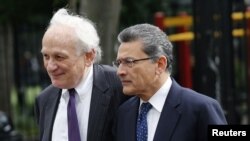NEW YORK - A jury in New York began deliberations Thursday in the insider trading case against Rajat Gupta, a former director of the Goldman Sachs investment banking firm and former head of McKinsey and Company, a global consulting firm.
Federal prosecutors say Gupta telephoned a friend and investment partner, Raj Rajaratnam, with information from a Goldman Sachs board meeting that investor Warren Buffett was going to invest $5 billion in the investment bank. That information had not yet reached the public. According to the prosecutors, Rajaratnam bought thousands of shares in Goldman Sachs, then sold them the next day when the news became public, earning a $1 million profit.
The jury of eight women and four men is considering six criminal charges against Gupta, including securities fraud and conspiracy to commit securities fraud. Gupta says he is innocent of all the charges.
Gupta’s attorney, in his closing argument to the jury, called the government’s evidence against his client guesswork and speculation. That evidence includes seven wire-tapped telephone conversations and 10 e-mails.
Judge Jed Rakoff, in his instructions to the jury, said the government must prove each charge beyond a reasonable doubt and that the law presumes a defendant innocent until proven guilty. While Gupta did not testify during the three-week trial, the judge reminded the jury that a defendant is never required to prove that he or she is innocent.
Supporters of Gupta argue that the evidence against him is circumstantial rather than direct. Judge Rakoff, in his jury instructions, said the law makes no distinction between the two. Attorney Lawrence Goldman, past president of the National Association of Criminal defense Lawyers, says circumstantial evidence can be overwhelming.
”This hits me as a strong circumstantial case," he said. "Very often, the circumstantial case is better than the direct case. The facts here seem to me, those facts are relatively incontrovertible. Yes, there was a board meeting at which this matter was discussed; yes, there was a telephone call from Gupta to Rajaratnam; yes, there was a trade.”
Attorney Goldman, not associated with this trial, says that in the past, there was what he calls a lax attitude in the United States toward insider trading - that is, buying and selling stocks based on information not available to the public. However, Federal prosecutors in New York have set their sights on insider trading and, a year ago, succeeded with the conviction of hedge fund manager Raj Rajaratnam on securities fraud charges. He is serving an 11-year prison term. Attorney Goldman says the prosecutors have done a very good job.
“But it probably is the tip of the iceberg," said Goldman. "All the criminal law can do at its best is warn people, punish people sometimes and tell people, you shouldn’t do it because you are taking a risk. And I think that’s been done.”
Rajat Gupta, 63 years old and born in India, faces up to 25 years in prison if convicted.
Federal prosecutors say Gupta telephoned a friend and investment partner, Raj Rajaratnam, with information from a Goldman Sachs board meeting that investor Warren Buffett was going to invest $5 billion in the investment bank. That information had not yet reached the public. According to the prosecutors, Rajaratnam bought thousands of shares in Goldman Sachs, then sold them the next day when the news became public, earning a $1 million profit.
The jury of eight women and four men is considering six criminal charges against Gupta, including securities fraud and conspiracy to commit securities fraud. Gupta says he is innocent of all the charges.
Gupta’s attorney, in his closing argument to the jury, called the government’s evidence against his client guesswork and speculation. That evidence includes seven wire-tapped telephone conversations and 10 e-mails.
Judge Jed Rakoff, in his instructions to the jury, said the government must prove each charge beyond a reasonable doubt and that the law presumes a defendant innocent until proven guilty. While Gupta did not testify during the three-week trial, the judge reminded the jury that a defendant is never required to prove that he or she is innocent.
Supporters of Gupta argue that the evidence against him is circumstantial rather than direct. Judge Rakoff, in his jury instructions, said the law makes no distinction between the two. Attorney Lawrence Goldman, past president of the National Association of Criminal defense Lawyers, says circumstantial evidence can be overwhelming.
”This hits me as a strong circumstantial case," he said. "Very often, the circumstantial case is better than the direct case. The facts here seem to me, those facts are relatively incontrovertible. Yes, there was a board meeting at which this matter was discussed; yes, there was a telephone call from Gupta to Rajaratnam; yes, there was a trade.”
Attorney Goldman, not associated with this trial, says that in the past, there was what he calls a lax attitude in the United States toward insider trading - that is, buying and selling stocks based on information not available to the public. However, Federal prosecutors in New York have set their sights on insider trading and, a year ago, succeeded with the conviction of hedge fund manager Raj Rajaratnam on securities fraud charges. He is serving an 11-year prison term. Attorney Goldman says the prosecutors have done a very good job.
“But it probably is the tip of the iceberg," said Goldman. "All the criminal law can do at its best is warn people, punish people sometimes and tell people, you shouldn’t do it because you are taking a risk. And I think that’s been done.”
Rajat Gupta, 63 years old and born in India, faces up to 25 years in prison if convicted.




